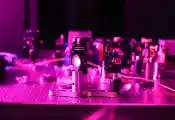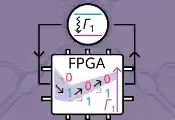Qubit Pharmaceuticals and Sorbonne University Reduce Number of Qubits Needed to Simulate Molecules
PARIS, July 11, 2024 — Qubit Pharmaceuticals , a deeptech company specializing in the discovery of new drug candidates through molecular simulation and modeling accelerated by hybrid HPC and quantum computing, announced that it has drastically reduced the number of qubits needed to compute the properties of small molecules with its Hyperion-1 emulator, developed in partnership with Sorbonne Université. This world first raises hopes of a near-term practical application of hybrid HPC – quantum computing to drug discovery.
As a result of these advances, Qubit Pharmaceuticals and Sorbonne Université are announcing that they have been awarded €8 million in funding under the France 2030 national plan for the further development of Hyperion-1.
“At the end of 2023, we announced quantum chemistry calculations using 40 qubits,” said Robert Marino, CEO of Qubit Pharmaceuticals. “A few months later, we’ve managed to solve equations that would require 250 logic qubits. An extremely rapid development that confirms the near-term potential of hybrid HPC and quantum algorithms in the service of drug discovery.”
By developing new hybrid HPC and quantum algorithms to leverage the computing power of quantum computers in the field of chemistry and drug discovery, Sorbonne Université and Qubit Pharmaceuticals have succeeded, with just 32 logic qubits, in predicting the physico-chemical properties of nitrogen (N2), hydrogen fluoride (HF), lithium hydride and water – molecules that would normally require more than 250 perfect qubits. The Hyperion-1 emulator uses Genci supercomputers, Nvidia’s SuperPod EOS, and one of Scaleway’s many GPU clusters.
With this first proof of concept, the teams have demonstrated that the routine use of quantum computers coupled with high-performance computing platforms for chemistry and drug discovery is much closer than previously thought. Nearly 5 years could be gained, bringing us significantly closer to the era when quantum computers (noisy or perfect) could be used in production within hybrid supercomputers combining HPC, AI and quantum. The use of these new computing powers will improve the precision, speed and carbon footprint of calculations.
To achieve this breakthrough, teams from Qubit Pharmaceuticals and Sorbonne University have developed new algorithms that break down a quantum calculation into its various components, some of which can be calculated precisely on conventional hardware. This strategy enables calculations to be distributed using the best hardware (quantum or classical), while automatically improving the complexity of the algorithms needed to calculate the molecules’ properties.
In this way, all calculations not enhanced by quantum computers are performed on classical GPUs. As the physics used allows the number of qubits required for the calculations, the team, by optimizing the approach to the extreme, has even managed to limit GPU requirements to a single card in some cases. As this hybrid classical/quantum approach is generalist, it can be applied to any type of quantum chemistry calculation, and is not restricted to molecules of pharmaceutical interest, but also to catalysts (chemistry, energy) or materials.
Next steps include deploying these algorithms on existing noisy machines to quantify the impact of noise, and compare performance with recent calculations by IBM and Google, and predicting the properties of molecules of pharmaceutical interest. To achieve this, the teams will deploy new software acceleration methods to reach regimes that would require more than 400 qubits with purely quantum approaches. In the short term, this hybrid approach will reduce the need for physical qubits on quantum machines.
“These innovative approaches developed by Qubit Pharmaceuticals are an illustration of Sorbonne Université’s commitment to serving society,” said Élisabeth Angel-Perez, Vice-President Research and Innovation at Sorbonne Université. “The precision and power of quantum computers offer major performance gains. With Qubit Pharmaceuticals, we measure the enormous potential of theoretical computing for quantum chemistry.”




































